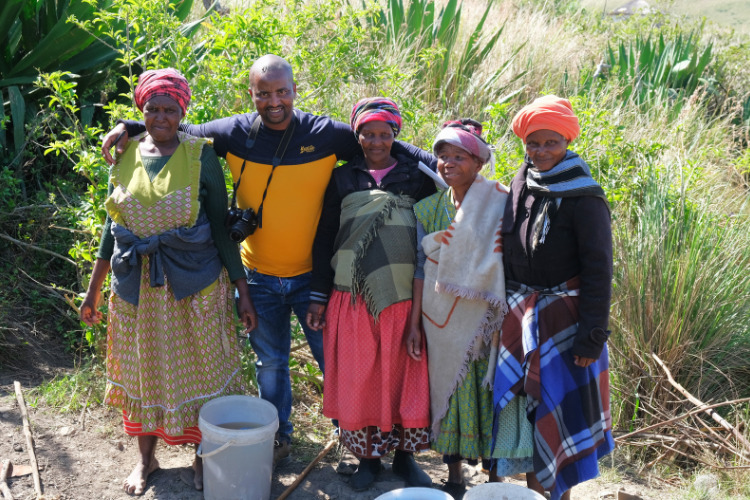
23 September 2023

Mkhuseli Sizani poses with women from Xhora Mouth while researching a story about water shortages in the Eastern Cape. Photo: Daniel Steyn
I would like to talk about the late Mkhuseli Sizani, my favourite journalist. He died on 12 September and his memorial service is today.
I was lucky, I knew Mkhuseli as a colleague. I sometimes talked with him about things that weren’t published and about the craft. He said I sounded like Stuart Baxter.
In GroundUp’s tribute, editor Nathan Geffen pointed to Mkhuseli’s extraordinary ability to write prolifically. Mkhuseli could pluck out worthy stories with ease because they clustered all around him.
Mkhuseli worked South Africa’s most difficult beat. He covered Gqeberha, a city that will not work for its residents and he covered the Eastern Cape, a province that hasn’t learned how.
He knew that there would be an injustice wherever he travelled, so off he went and filed stories with every stop along the way.
People wanted to share their lives with him and he took great care with what he was shown and told. He drove to the forgotten reaches and shared the matters that were pressing on local minds.
He attended to a hundred small town problems - unfinished schools, collapsed infrastructure, uncollected rubbish. He showed us the ways that people wait for their grants. He would catch the embers of a protest that had blocked a road out of town.
I loved most how he patiently caught details from people. He gave them the time to be profound. He let them find words that tacitly illuminated their community. He offered them the courage to speak honestly.
In Qunu, he found this while talking to a woman, a former domestic worker, who had been forced to abandon her vegetable patch for want of water and money:
“Mandela’s death made us victims of wealthy people,” said Hako.
In Seymour, Fort Beaufort, he met people trapped with a bridge long in need of repair:
Daries said “If it rains before the children go to school many parents keep them home. Sometimes if it rains while the learners are at school, the residents on the other side of the river keep them in their homes until the water sinks.”
Among people living in Gqeberha’s homeless communities, he caught a tragedy in two paragraphs:
Mahlubandile Mhlekwa, 44, from Qonce lives with two of his friends in the bushes next to the N2 in Young Park. He has been there for three years. “Every day I wake up and look for scrap metals and cans for recycling. I usually make R90 a day. The first thing I do is to buy food for R50. Then with the R40 I buy drugs to smoke because I don’t want to think too much.
“I chose to live here because I want peace. Living with my relatives in New Brighton township caused me depression. After the mother of my children died life has not been easy. I have worked at various companies. I worked for five years at Sasko and due to depression I resigned in 2016.”
No single article is enough to understand what Mkhuseli achieved as a journalist. He covered the Eastern Cape.
His triumph was telling us a story of a struggling city and a decrepit province across articles, for GroundUp and others. His great story was the fine mesh linking each. He asked that we listen to the people with the least and demanded that they be given a fair shout. There was a better way, he suggested, if only the work was done.
He will be loved as a journalist that embodied the purest ideals of the profession. I will always remember him, admire him, and try my very best to emulate him.